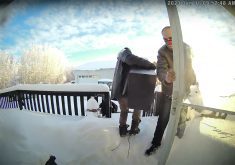The Alberta government plans to take a harder line against rural crime and today announced measures to begin that process.
Provincial justice minister Doug Schweitzer said a Rural Alberta Provincial Integrated Defence Force (RAPID) will be created that will train about 400 sheriffs, fish and wildlife officers and commercial vehicle enforcement personnel to respond to 911 calls about rural crime. The idea is to reduce response times when no RCMP officers are near.
“The changes will allow these officers to respond to a wider range of calls and to assist the RCMP and other police services in some emergencies,” the government said in its announcement.
Read Also

Farming Smarter receives financial boost from Alberta government for potato research
Farming Smarter near Lethbridge got a boost to its research equipment, thanks to the Alberta government’s increase in funding for research associations.
It plans to have the additional personnel trained and ready to assist on rural Alberta calls by fall 2020.
Schweitzer also announced changes designed to strengthen the rights of property owners. Changes to the Occupiers Liability Act would eliminate liability of property owners who are protecting their property against trespassers who are breaking the law.
The provision would be retroactive to Jan. 1, 2018, a date that would preclude Ryan Watson, a perpetrator in a well-publicized event at the home of Eddie Maurice of Okotoks, Alta., from suing Maurice in a civil action.
Schweitzer, who has been conducing a series of rural crime meetings across the province in recent months, said during a Wetaskiwin area news conference that the Maurice case has been mentioned at every single meeting.
“Every rural Albertan can relate to Eddie Maurice,” he said.
In February 2018, Maurice fired two warning shots when he saw two people going through his vehicles parked in his yard. The ricochet from one shot struck Watson in the arm. Maurice then faced criminal charges of aggravated assault, pointing a firearm and careless use of a firearm. Those charges, which raised considerable rural outcry over defence of property, were later dropped.
Watson subsequently filed a $100,000 civil suit against Maurice for pain, suffering and loss of income. Maurice responded with a counter claim for $150,000 against Watson.
Further to changes to the Occupiers Liability Act, Alberta plans to increase the maximum fines for trespassing offences to $10,000 for a first violation and $25,000 for subsequent ones, plus possible jail time of up to six months.
“Corporations that help or direct trespassers would face fines up to $200,000. In addition to these increases, a proposed change would increase the maximum amount a court can order for loss of or damage to property from $25,000 to $100,000,” the government said.
In efforts to reduce metal theft of such things as copper wire, telecommunications cables and other materials, the government proclaimed the Scrap Metal Dealers and Recyclers Identification Act.
It will require dealers and recyclers to get proof of identification from sellers, record the details and share information with law enforcement. The necessary mechanisms for that are expected to be in place in spring 2020.
Another change to current practice is provision for community impact statements to be given in court when convicted offenders are sentenced. Such a statement could be written on behalf of any group affected by a crime. Forms for that will be available in January.
“There will also be additional support for victims, via a new Restitution Recoveries Program,” the government said.
“The program will help victims collect outstanding payments on restitution orders by giving government the authority to use enforcement measures against offenders, such as garnishing wages or seizing and selling property, as needed.”
Contact barb.glen@producer.com


















